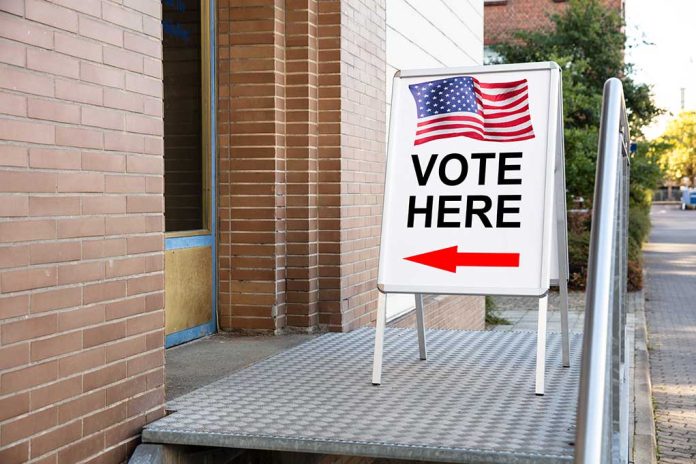
John Ewing Jr. made history in Omaha as the city’s first Black mayor, defeating three-term incumbent Jean Stothert in an election where national political undercurrents proved impossible to ignore.
Key Takeaways
- John Ewing Jr. has been elected as Omaha’s first Black mayor in a historic upset victory over three-term incumbent Jean Stothert.
- Despite being outfunded, Ewing’s campaign successfully linked Stothert to Trump-era policies while focusing on practical local issues like job creation and affordable housing.
- Stothert’s controversial campaign tactics, including an anti-trans mailer, backfired as voters embraced Ewing’s message of constructive governance.
- The election results signal a potential political shift in Nebraska’s competitive 2nd congressional district that could impact future electoral contests.
Historic Victory in Nebraska’s Largest City
In a significant political upset, Douglas County Treasurer John Ewing Jr. has been elected as Omaha’s first Black mayor, defeating three-term incumbent Jean Stothert. The election represents a remarkable change for Nebraska’s largest city, which has historically leaned conservative in local politics. Ewing’s victory came despite being outspent in the campaign, suggesting that his message of practical governance and community leadership resonated strongly with voters tired of divisive rhetoric. The election also saw several other key races decided, including LaVonya Goodwin winning the District 2 City Council race over Ben Gray.
Stothert, who had served as mayor since 2013, conceded gracefully after the results became clear. While the mayoral race is officially nonpartisan, the political affiliations of both candidates were well known to voters, with Stothert being a Republican and Ewing a Democrat. Three Republican city council members retained their seats, ensuring some continuity in city governance despite the change at the top. Voters also approved a city charter amendment requiring special elections to fill City Council vacancies if they occur in the first two years of a term.
🚨MAJOR BREAKING NEWS: In a defeat that has left MAGA STUNNED, Democrat John Ewing Jr. has just won the mayoral race in deep red Omaha, Nebraska, defeating twelve-year GOP incumbent Mayor Jean Stothert.
This makes him the first Black mayor in the history of the city.
More:… pic.twitter.com/T2S0keUX0Y
— CALL TO ACTIVISM (@CalltoActivism) May 14, 2025
Stothert’s Concession and Legacy
In her concession speech, Stothert expressed pride in her accomplishments during her twelve years in office. “John Ewing is inheriting tonight a great city. And we leave a strong foundation for the city that we all love. We are proud, we are grateful, and we are hopeful,” Stothert said. She maintained that she had no regrets about her time in office, emphasizing that her administration had positioned Omaha well for future growth and development. The peaceful transition of power stands in stark contrast to the contentious nature of the campaign itself.
The election featured multiple competitive races beyond just the mayoral contest. LaVonya Goodwin, who won her City Council race, acknowledged the effort that went into her campaign. “Getting here has been a lot of hard work,” she remarked after her victory. The combination of these results suggests a potential shift in the political landscape of Omaha, with Democrats making significant inroads in what has traditionally been a Republican-leaning area. This could have implications for future elections at both the local and national levels.
Campaign Tactics and National Politics
While officially nonpartisan, the race became entangled with national political themes. Ewing’s campaign effectively capitalized on anti-Trump sentiment, framing Stothert as aligned with the divisive politics associated with the former president. His campaign message urged voters to “say no to the chaos and elect a mayor who will actually get things done” – a clear reference to the perception of turbulence in national politics. This messaging strategy proved effective despite Stothert’s attempts to distance herself from national Republican figures.
A controversial moment in the campaign came when Stothert’s team distributed an anti-trans mailer that was widely criticized as divisive and inappropriate for a local election. The tactic appeared to backfire, reinforcing Ewing’s portrayal of his opponent as engaging in the type of politically divisive behavior that many voters were seeking to move beyond. Ewing, by contrast, maintained focus on practical local issues like job creation, affordable housing, and economic development in Omaha’s urban core. The election outcome suggests that voters responded positively to this approach.
Implications for Future Elections
Political analysts are already examining what Ewing’s victory might mean for future elections, particularly in Nebraska’s competitive 2nd congressional district. The district, which includes Omaha, has become something of a political battleground in recent years. Republican Representative Don Bacon currently holds the seat but may face increased challenges in upcoming elections if this result indicates a genuine shift in voter sentiment. The district’s electoral behavior will be closely watched as an indicator of broader political trends in areas that have traditionally leaned conservative but may be becoming more competitive.
Ewing’s emphasis on being a role model for young people also resonated with voters looking for inspirational leadership. As Omaha’s first Black mayor, his election represents an important milestone in the city’s history. While avoiding explicitly partisan rhetoric during the campaign, Ewing nevertheless presents a stark contrast to his predecessor in both style and substance. His victory suggests that Omaha voters were ready for a change after twelve years of Stothert’s leadership, regardless of the city’s generally conservative reputation.
Sources:
Election 2025: Omaha elects John Ewing Jr. mayor in historic upset
The Trump Effect Is Here: Democrats Sweep to Victory in Historic Upset







